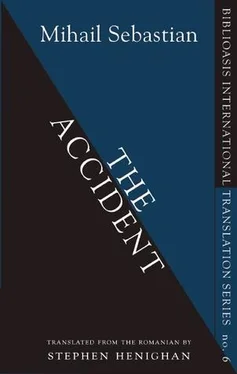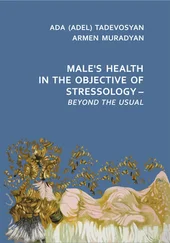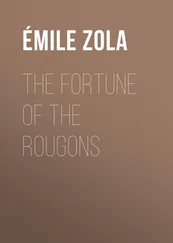Later, he had learned from a word uttered at random that one day they had vacationed together, very close to each other, without yet knowing one another.
“Six years ago, when we were in Satu-Lung…”
“Six years ago? Are you sure?”
“Yes. In 1926. In August.”
Paul suddenly saw again his whole vacation at Cernatu, those four weeks of solitude spent in the small town in the Braşov region, the street corner where, without any transition, Satu-Lung began and where, as though crossing a border, he passed the invisible line between the communities. He saw again the group of young women and men who came down the hill in the morning towards Satu-Lung, disorderly, rowdy, a little threatening, with that feeling of being in a strange town in which nobody knew them and nothing compromised them: they ate pretzels in the middle of the street, shouted at the top of their lungs, raced from one sidewalk to the other, threw stones at the trees at the edge of the road — those charming Cernatu apple trees, with their trunks whitewashed halfway up their height and their luscious green leaves.
Every day their passage along the “promenade,” a wooden bridge laid over the sidewalk, erupted in these noises. Scandalized Saxon women 5appeared at their windows, intimidated children halted in front of their doors, young women from good families “of the region,” who were reading or studying on the park benches, barely dared to lift their heads in the direction of this bunch of lunatics, dishevelled barefoot girls, boys without coats or ties…
The hostility between the civilian population of Cernatu and the group from Satu-Lung was open to the point where Paul, when he went out for his evening walk, if he turned left alongside the city hall, had the feeling of stepping into a conflict zone or an enemy territory. The group had the custom of a tennis hour. Their tennis court became famous in the whole region, as far away as Dârste or Noua. White poles, lime rectangles drawn on the earth, the net stretched taut across the centre, the white fence that surrounded the whole court — they had made it all, bringing some of the pieces from Braşov 6and improvising others on the spot, to the secret vanity of Satu-Lung, and to the smouldering envy of Cernatu. Paul liked to stop there, in front of the wire fence, and watch the flurry of rackets, the regular knocking of the ball, the white dresses of the female players. One evening a ball lofted too high went over the fence and came to a stop next to him. He picked it up in order to hand it to the young woman player who had come to look for it.
“Possibly that was you, Ann?”
“Very possibly, my dear. I played more than any of them. I played badly — I’d only just learned — but I played a lot.”
The thought that he had stared at her so many years earlier, before falling in love with her, before he’d even known who she was, the thought that there had once been a moment in which they had looked each other in the eyes, in which they had perhaps spoken — he to hand her the lost tennis ball, she to thank him — this thought exalted him. How many distances had been traversed between the white-clad tennis player bending towards him for a moment with her racket in hand, on an August evening in 1926, and that familiar, painful Ann!
He could still see the municipal train that made the regular run to Satu-Lung, its yellow carriages, its outmoded engine, the disproportionately loud shriek of its whistle in the minuscule stations, a train glistening at night when it got delayed in Braşov and he returned home on the last run on the local line…
On a night like that, the train had been stopped before Noua by the group from Satu-Lung, who blocked its path, sitting down on the rails and waving their illuminated flashlights, their white jerseys, their scarves…The passengers were indignant, the on-board staff, their self-respect wounded (“A train stopped like an ordinary wagon!”), threatened legal action and fines, everybody was clamouring at once, but they seemed not to hear any of it, or maybe really didn’t hear. They were coming from Râşnov, one of the more reasonable ones said, they were dead-tired and couldn’t miss the last departure. They invaded the carriages without being aware of the scandal they had caused.
It was late, the passengers were drowsy, the train was emptying out, with people getting off at Dârste, at Turcheş. The revolt was assuaged… Beyond Turcheş nothing was heard but the silence of that August night, occasionally broken by the locomotive’s whistle. Then they began singing: a romantic song that was in fashion, and was sung by fiddlers in Braşov, but which now, at that hour of the night, in their youthful voices, took on an unexpected melancholy.
Paul, remembering that moment, would have liked to silence all the instruments with a single gesture, like that of an orchestra director, leaving only the soloist’s violin audible; he would have liked to be able to suppress in his memory the voices of all of the others in order to preserve Ann’s voice as it would have been on that August night in 1926.
“Why didn’t I meet you then?” she used to say. “Why did so many years have to pass before I met you? Why didn’t somebody say to me on that evening: ‘See that young gentleman next to the window? One day you’re going to fall in love with that gentleman…’
“Even so, how can I know it wasn’t better that way? I think you wouldn’t have become my lover and I think I would have been too thick and I wouldn’t have liked you. I used to like boys who danced well, and you dance so badly! I don’t know how much I’ve changed since then. I used to wear awful hairdos and short dresses, I was scatterbrained, I was wild, I was… look how I was.”
And taking from the table a charcoal pencil, she drew on the sketch pad a fine outline of a scatterbrained girl with her legs in the air as if leaping, with her arms open, with her hair floating in the wind. In a few seconds the pad was full of images, which repeated the same sketch of the wild girl, seeming to relay the stylish leaps from image to image. From this game emerged, over a few days, an entire series of drawings and watercolours, some of which had been shown that same autumn at the Black and White Gallery, while others, later that winter, came to occupy a whole wall at her one-woman show bearing the same title: August 1926 .
Paul watched the birth of these images with astonishment. Her charcoal pencils seemed to revive them, releasing them from her own memory. Nothing was missing: neither the walk from Cernatu, nor the tennis court, nor the municipal train with its yellow carriages, nor the minuscule train stations full of sunlight, where a few young Saxon women sat waiting with their immense hats of yellow straw on their heads and their huge, flat, rural handbags…
For a long time he had known nothing about her, in spite of the greeting on the street, even though they had happened to exchange a few words on a couple of occasions. The mere mention of the short form of her name, that pretentious “Ann,” irritated him, when Anna would have been such a pleasant name.
Now, when their love had become such a grinding agony for him, he tried to locate again in his memory that lost, indifferent Ann of the early days, to pin to small truths from the past the appearance of this young woman whom he had barely known and who, at that time, could do him neither harm nor good. In his mind there were certain calm territories, certain zones of indifference, to which he returned when the image he had today of his lover struck him as intolerable. He took pains to reconstitute each detail of those old events and to return to them with care, as though to a few old photographs that he was afraid to find drained of colour by the years.
Читать дальше












